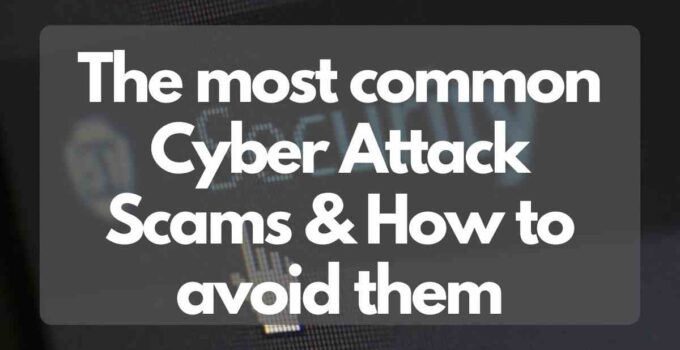Every year, cybersecurity threats are becoming more sophisticated and challenging to spot until it’s too late. Cybercriminals tend to go after bigger targets, namely large businesses and companies, but it seems like nobody is safe anymore. Threat intelligence reports help identify potential cyberattacks, but we should still learn how to avoid them.
So, what is the best way to stay safe online? There is no straightforward answer to that question because you should deal with the problem by applying several methods at the same time. For example, keeping up with cybersecurity trends can help enormously. But you should also work on your cyber hygiene almost daily.
Without further ado, let’s go through the most common cyberattacks and scams reported this year and learn how to avoid them successfully in the future.
5 common cybersecurity threats
The Internet of Things attacks
As we embrace the new tech and introduce smart devices into our daily lives, we are working on connecting everything around us into our own little network. Even if we don’t plan on creating a smart home or workspace, our devices still sync and share data. And IoT networks can be an easy target for cybercriminals.
If hackers find a vulnerability in one of the devices, they could use it against you. Imagine what they might do if they had access to your smart locks or alarm system. Not to forget that cybercriminals could ask for money to return full access to your smart devices.
Cryptojacking
Have you noticed poor computer performance lately? Chances are cybercriminals have hijacked it for mining.
The popularity of cryptocurrencies resulted in hackers trying to take over third-party computers and their processing power to mine more virtual money. Your system might be seriously affected by cryptojacking, so it is important to pay attention to any sudden change in performance.
Hackers hijack personal and work computers and mobile devices by sending malicious links via email or messages. You could also pick up the script code by visiting a website or clicking on an infected ad. While these scripts won’t steal your personal information, they can slow down your device and increase your electricity bill.
Ransomware
Even though ransomware attacks have been in the headlines for years, it seems that the popularity of this cyberattack is not dwindling. We have seen several large ransomware attacks in 2023 as hackers targeted well-known businesses. One of the most significant attacks happened in September when MGM Resorts in Las Vegas was shut down, resulting in a major financial loss.
Cybercriminals prefer targeting businesses that could pay more to regain access to their networks. But individuals with poor cyber hygiene are in danger, too. Learning about good cybersecurity habits and using the data gathered by threat intelligence could prepare you for a ransomware attack before it happens.
Phishing
Phishing will probably remain at the very top of the common cyberattacks because it is easy to execute, and targets often don’t question links and attachments received via email as long as they look legitimate. While businesses warn their employees about the dangers of phishing, it will become more challenging to spot a fake message or email, thanks to the emergence of ChatGPT.
Cybercriminals can use artificial intelligence to generate believable emails without grammatical errors, which could lead anyone to think that a message is authentic. Therefore, you might assume a link in the message is also safe to open. So, good common sense and judgment are no longer enough – using tools to help us recognize fake messages and dangerous links is crucial.
Cloud hacking
Cloud storage has a long list of benefits, but cybersecurity is at the very top. Since many businesses and individuals use the cloud daily, cybercriminals are aware it is a treasure trove of data and actively try to find vulnerabilities that would allow them to access these services.
Hackers use past data breaches to identify compromised accounts, attempt phishing attacks, or even search for unsecured parts of APIs. Cloud users who reuse passwords and don’t have a two-factor authentication setup are the easiest targets.
How to avoid cyberattacks and scams
Now that we have covered the most common cyberattacks and scams, it is time to discuss avoiding them and increasing your cybersecurity overall.
Create strong passwords
Since cybercriminals often use login information to gain access to your account, you should start by changing your passwords. Many people still tend to type in the same password across websites and services because it is easier to remember. Unfortunately, hackers can use this against you.
Make sure you create a unique password for each account and use special characters, numbers, and uppercase and lowercase letters. If you have an option to enable two-factor authentication, do it. This simple step will ensure that you are the only person with access to your account.
Update the software
Hackers have used system vulnerabilities and outdated software to gain access to a network numerous times in the past. Keeping your software up to date is not complicated as it is usually done automatically. If you see a popup window letting you know a new software version is available, don’t ignore it. The same goes for your operating system on all devices.
Learn how to recognize phishing
When you receive an email from an unknown sender, always question the source of the message. Hackers might use perfect grammar, but there are still telltale signs that could tell you more. For instance, check the email address first. If a suspicious email is from a bank or a streaming service, it should be sent from an official address.
Most importantly, don’t type in your personal information or use your login credentials unless you are sure a website is legitimate. And never open attachments from unknown senders.



